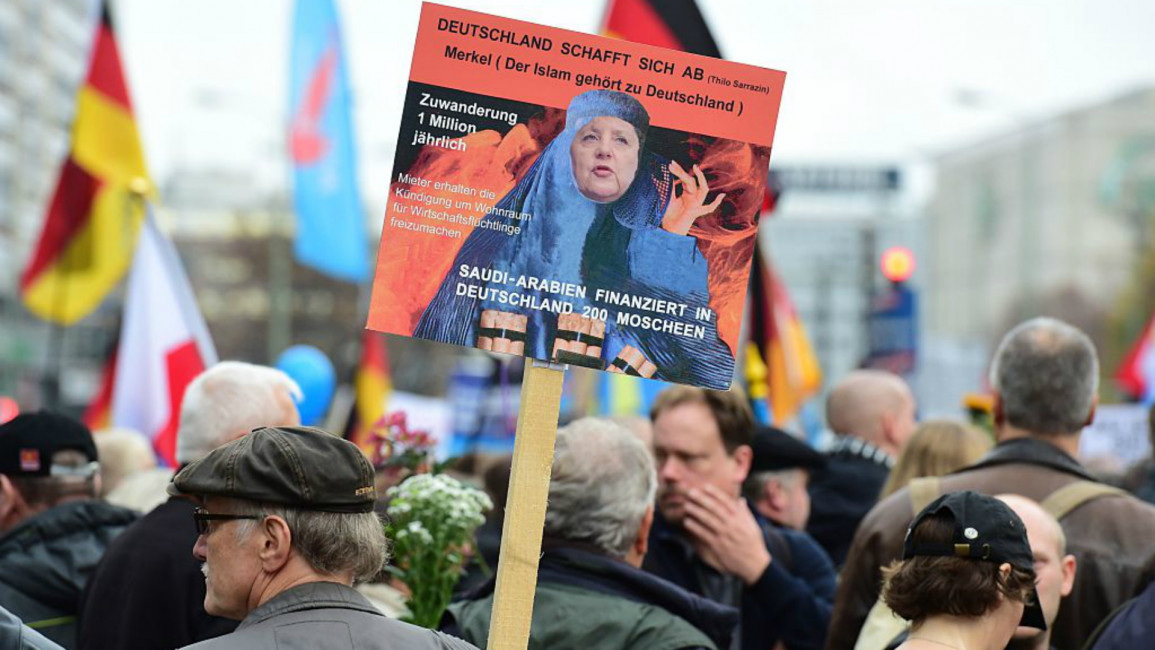
Merkel's burqa ban: Germany not immune to populism
In late 2015, Angela Merkel defended her decision to open Germany's doors to migrants - many fleeing Syria's devastating civil war.
She said offering sanctuary to refugees was "part of the basic humanity of our county". With statements and policies like this, the German Chancellor seemed, at the time, to be a voice of relative compassion, amid a chorus of callous nativism from other European leaders.
But her poll ratings dropped sharply as a significant section of German society resented the one million migrants who arrived in 2015 as a burden and an imposition. As a result, she has increasingly been giving ground to right wing anti-immigration sentiment in Germany - which is as much an expression of Islamophobia as xenophobia.
The latest proof of this was her endorsement on Tuesday of a ban on full face veils (the burqa or niqab) in some public settings, including schools, universities and courts. In the same speech to her Christian Democratic Union (CDU) party conference, she also emphasised that asylum seekers refused permission to stay, would be quickly deported - pandering to her conservative support base.
Having announced her intention to stand for a fourth term, several factors are playing into Merkel's political calculus. All point to the need to abandon any illusions that Germany is immune to right wing populism.
Perhaps most important is the recent rise of Alternative for Germany (Alternative fur Deutschland) known as the AfD. Founded in 2013 with a Eurosceptic agenda, the accession of Frauke Petry as leader in January this year has seen its growth mushroom.
Like Marine Le Pen in France, charismatic female leaders appear to be something of a secret ingredient for far right parties, traditionally unable to attract women voters.
 |
It is only a short step from this culture of collective blame and suspicion to institutionalising Islamophobia |  |
Despite - or perhaps because of - Petry's shocking calls for migrants to be prevented from crossing into Germany with "firearms" if "necessary", the AfD made strong gains in regional German elections in March 2016, entering state parliament for the first time in three states.
Soon after, it adopted Islamophobic policies to complement its anti-immigrant stance, calling for a ban on minarets and the burqa. A Bavarian faction of the party even called for the AfD to advocate a complete ban on all mosques.
These anti-Muslim policies appear to have further helped, rather than hindered it, electorally. In September 2016, the AfD won 14 percent of votes in Berlin and pushed Merkel's CDU party into third place in Mecklenburg-Western Pomerania.
And Islamophobia has made itself known in Germany on the streets as well as at the ballot box. The AfD has been dubbed "the political arm" of PEGIDA, the "anti-Islamisation" movement which spread throughout the country but remained strongest in Dresden.
Although the recent Austrian election thankfully bucked the trend of seemingly unstoppable far right success, Merkel clearly feels she cannot underestimate the threat. Given the shockwaves of Brexit and Trump, plus pressure from below in the form of PEGIDA and from above in the shape of the AfD, she is tacking right, hard.
Europe's so-called "summer of fear" only exacerbated matters. Four attacks in Germany in one week in July 2016 increased fears about terrorism and deepened public perceptions of a link to immigration and Islam.
 |
Merkel's announcement is worryingly in tune with the political climate on the continent |  |
More hopefully, the country has also seen a wave of demonstrations by left wing activists - acutely conscious of their country's recent history - in response to trends like PEGIDA, and opposing racism, xenophobia and knee-jerk reactions to security threats.
But the rhetoric and practices of the "war on terror" in Germany - as in other western countries - turns the country's four million strong Muslim population into a suspect community. In July 2016 Merkel called on Muslim community leaders to "more clearly reject terrorism".
It is only a short step from this culture of collective blame and suspicion to institutionalising Islamophobia, whether in the name of counter-extremism or integration.
Despite France's total ban on the face veil (established in 2010) having achieved only the effect of excluding some Muslim women from the public sphere, the Netherlands and Norway recently moved to follow suit with a partial ban. Bulgaria, Belgium and some regions of Switzerland have also implemented similar laws.
Thus Merkel's announcement is worryingly in tune with the political climate on the continent. The failure of legal strategies to challenge the French precedent means that if the measure goes through in Germany - as seems likely - it will be even harder to turn back Europe's tide of Islamophobia.
Hilary Aked is an analyst and researcher whose PhD studies focus on the influence of the Israel lobby in the United Kingdom.
Follow her on Twitter: @Hilary_Aked
Opinions expressed in this article remain those of the author and do not necessarily represent those of The New Arab, its editorial board or staff.



